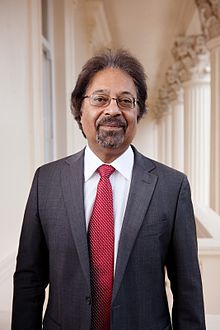Tejinder (Jim) Virdee | |
|---|---|
 Tejinder Virdee on the balcony of the Royal Society in July, 2012 | |
| Born | Tejinder Singh Virdee 13 October 1952 |
| Nationality | British |
| Alma mater | Queen Mary College, University of London (B.Sc.) Imperial College London (Ph.D.) |
| Known for | Originating the concept and overseeing the construction of CMS |
| Awards | IOP Chadwick Medal and Prize (2009) Special Breakthrough Prize in Fundamental Physics (2013) EPS HEPP Prize (2013) IOP Glazebrook Medal (2015) APS Panofsky Prize (2017) Royal Medal (2024) |
| Scientific career | |
| Fields | Physics (particle physics) |
| Institutions | Imperial College London |
| Thesis | Sigma Hyperon Production in a Triggered Bubble Chamber (1979) |
| Doctoral advisor | Peter Dornan FRS |
Sir Tejinder Singh Virdee, FRS (Punjabi: ਤਜਿੰਦਰ ਸਿੰਘ ਵਿਰਦੀ, born 13 October 1952), is a Kenyan-born British experimental particle physicist and Professor of Physics at Imperial College London.[1] He is best known for originating the concept of the Compact Muon Solenoid (CMS) with a few other colleagues and has been referred to as one of the 'founding fathers' [2] of the project. CMS is a world-wide collaboration which started in 1991 and now has over 3500 participants from 50 countries.
Virdee was elected Fellow of the Royal Society[3] and of the Institute of Physics (IOP) in 2012. In recognition of his work on CMS he has been awarded the IOP High Energy Particle Physics group prize (2007)[4] and the IOP Chadwick Medal and Prize (2009).[5] In 2012, he was awarded the 2013 Special Breakthrough Prize in Fundamental Physics for 'leadership in the scientific endeavour that led to the discovery of the new Higgs-like particle by the ATLAS and CMS collaborations at CERN's Large Hadron Collider (LHC) along with 6 other physicists.[6] He was awarded the 2013 European Physical Society High Energy and Particle Physics Prize[7] and the 2017 American Physical Society Panofsky Prize for his pioneering work and outstanding leadership in the making of the CMS experiment.[8] In 2020 he was awarded the Blaise Pascal Medal of the European Academy of Sciences in Physics.[9]
Virdee has served on Scientific Advisory Committees of numerous international physics institutes and on the Physical Sciences jury for the Infosys Prize in 2020 [10] In 2014, Virdee was knighted in the Queen's Birthday Honours list for services to science.[11] In 2015 he was awarded the IOP Glazebrook Medal and Prize for his leadership of the Compact Muon Solenoid (CMS) experiment at the Large Hadron Collider (LHC) where evidence for the Higgs boson was revealed after 20 years of research involving design, construction and data-taking.
- ^ "Imperial College Reference".
- ^ "CERN Courier Article: Inside story: the search in CMS for the Higgs boson". CERN Courier. Retrieved 7 December 2012.
- ^ "Fellow of the Royal Society".
- ^ "2007 HEPP Prize". Retrieved 7 December 2012.
- ^ "Chadwick Medal".
- ^ "2012 Special Fundamental Physics Prize". Retrieved 11 December 2012.
Virdee plans to use the money to support science in schools in Sub-Saharan Africa—see Peter Woit (12 June 2013). "Nature on the new Nobels". Not Even Wrong. Retrieved 22 June 2013.
- ^ "2013 European Physical Society High Energy Physics Prize" (PDF).
- ^ "W.K.H. Panofsky Prize in Experimental Particle Physics". APS Physics. Retrieved 5 January 2017.
- ^ "EURASC Awardees - Blaise Pascal Medals". European Academy of Sciences. Retrieved 11 June 2020.
- ^ "Infosys Prize - Jury 2020". www.infosys-science-foundation.com. Retrieved 10 December 2020.
- ^ "Knighthood" (PDF). British Government. Retrieved 12 July 2014.